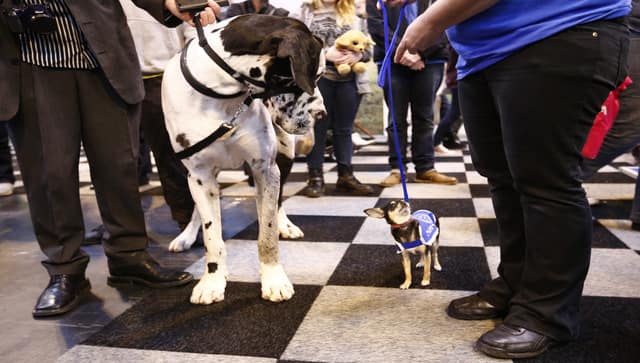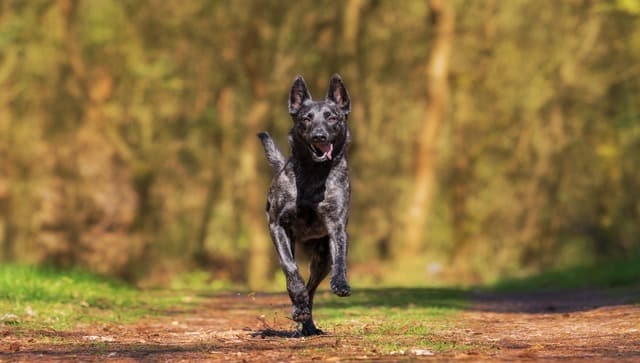Dog lovers have a reason to rejoice as Man’s Best Friend could live longer in the near future. An anti-ageing drug for dogs has received a key nod from the United States’ Food and Drug Administration (FDA). The drug, LOY-001, is being developed by Loyal – a San Francisco-based biotech company. On Tuesday (28 November), Loyal said that the FDA granted conditional approval to the Reasonable Expectation of Effectiveness section of its application. What is this potential miracle drug that could extend a dog’s lifespan? Let’s take a closer look. Anti-ageing drug for dogs Loyal is working on LOY-001 which is an injection for healthy dogs above the age of seven and over 40 pounds (18 kg approximately). The jab can be administered by veterinarians every three to six months if it gets approval, as per Daily Express newspaper. According to the CEO and founder of Loyal For Dogs Celine Halioua, LOY-001 is designed to extend the lifespan of larger dogs who often die much earlier than smaller canines. [caption id=“attachment_13450472” align=“alignnone” width=“640”] LOY-001 is designed to extend the lifespan of large dogs. Reuters (Representational Image)[/caption] Larger dogs generally live for about 8 to 12 years, as per the American Kennel Club. The lifespan of a furry friend – 10 to 13 years – is a just small fraction of an average human’s, noted Smithsonian magazine. “If a big dog is, you know, getting sick and dying from age-related diseases at age seven, eight, nine, he’s going gray at age four. He’s getting a limp at age five,” Halioua told BBC in August. “The rate of ageing is so high that you can tell if a drug is impacting that in about six to 12 months." How will the drug work? The anti-ageing drug will target the growth and metabolism hormone IGF-1. This hormone is present in higher levels in larger dogs and in lesser amounts in smaller canines, reported Smithsonian. The drug will lower the level of the hormone IGF-1 which is responsible for larger canines to grow in size at a young age, Daily Express reported citing Loyal. The hormone reportedly cuts the health lifespans of larger breeds. The company believes selective breeding of
dogs
for size has contributed to a reduction in the lifespan of larger dogs. By decreasing the level of this hormone, Loyal aims for larger dogs to stay healthier for a prolonged period. The company is also working on other drugs — LOY-002 for all but the smallest older dogs and LOY-003, a pill for larger and giant breed dogs, as per Daily Express. ALSO READ:
Will humans be able to grow young again after study makes reverse ageing possible in mice?
Longevity drug passes major hurdle The company has passed the initial criteria needed for the FDA’s green light. As per a letter shared by Loyal with the New York Times (NYT), a representative from the FDA said, “The data you provided are sufficient to show that there is a reasonable expectation of effectiveness.” CEO Halioua announced on her company’s blog, “I’m so proud to announce that Loyal has earned what we believe to be the FDA’s first-ever formal acceptance that a drug can be developed and approved to extend lifespan." [caption id=“attachment_13450482” align=“alignnone” width=“640”]
LOY-001 is designed to extend the lifespan of large dogs. Reuters (Representational Image)[/caption] Larger dogs generally live for about 8 to 12 years, as per the American Kennel Club. The lifespan of a furry friend – 10 to 13 years – is a just small fraction of an average human’s, noted Smithsonian magazine. “If a big dog is, you know, getting sick and dying from age-related diseases at age seven, eight, nine, he’s going gray at age four. He’s getting a limp at age five,” Halioua told BBC in August. “The rate of ageing is so high that you can tell if a drug is impacting that in about six to 12 months." How will the drug work? The anti-ageing drug will target the growth and metabolism hormone IGF-1. This hormone is present in higher levels in larger dogs and in lesser amounts in smaller canines, reported Smithsonian. The drug will lower the level of the hormone IGF-1 which is responsible for larger canines to grow in size at a young age, Daily Express reported citing Loyal. The hormone reportedly cuts the health lifespans of larger breeds. The company believes selective breeding of
dogs
for size has contributed to a reduction in the lifespan of larger dogs. By decreasing the level of this hormone, Loyal aims for larger dogs to stay healthier for a prolonged period. The company is also working on other drugs — LOY-002 for all but the smallest older dogs and LOY-003, a pill for larger and giant breed dogs, as per Daily Express. ALSO READ:
Will humans be able to grow young again after study makes reverse ageing possible in mice?
Longevity drug passes major hurdle The company has passed the initial criteria needed for the FDA’s green light. As per a letter shared by Loyal with the New York Times (NYT), a representative from the FDA said, “The data you provided are sufficient to show that there is a reasonable expectation of effectiveness.” CEO Halioua announced on her company’s blog, “I’m so proud to announce that Loyal has earned what we believe to be the FDA’s first-ever formal acceptance that a drug can be developed and approved to extend lifespan." [caption id=“attachment_13450482” align=“alignnone” width=“640”] Loyal aims to begin a clinical trial for LOY-001 involving about 1,000 large and giant dogs next year or in 2025. Pixabay (Representational Image)[/caption] She told Business Wire, “Loyal was founded with the ambitious goal of developing the first drugs to extend healthy lifespan in dogs. This milestone is the result of years of careful work by the team. We’ll continue to work just as diligently to bring this and our other longevity programmes through to FDA approval.” Speaking to New York Post, the 29-year-old CEO it is not known how many years will be increased in a dog’s life due to LOY-001. “We don’t know an actual quantitative extension number [that the drug will tack onto a lifespan]”. “The shots are expected to help bigger dogs have a higher quality of life for a longer time by reducing incidents of age-related diseases,” The New York Post quoted her as saying. Loyal intends to begin a clinical trial for LOY-001 involving about 1,000 large and giant dogs next year or in 2025, with a goal to roll out the drug by 2026. Moreover, we do not know how this drug would affect the quality of life of our furry friends. “If it proves true that it extends life span, I’m only interested in that if the period of life that is extended is good quality life. I don’t want to make my dog live an extra two years in poor health,” Kate Creevy, a veterinarian at Texas A&M University, told the Times. With inputs from agencies
Loyal aims to begin a clinical trial for LOY-001 involving about 1,000 large and giant dogs next year or in 2025. Pixabay (Representational Image)[/caption] She told Business Wire, “Loyal was founded with the ambitious goal of developing the first drugs to extend healthy lifespan in dogs. This milestone is the result of years of careful work by the team. We’ll continue to work just as diligently to bring this and our other longevity programmes through to FDA approval.” Speaking to New York Post, the 29-year-old CEO it is not known how many years will be increased in a dog’s life due to LOY-001. “We don’t know an actual quantitative extension number [that the drug will tack onto a lifespan]”. “The shots are expected to help bigger dogs have a higher quality of life for a longer time by reducing incidents of age-related diseases,” The New York Post quoted her as saying. Loyal intends to begin a clinical trial for LOY-001 involving about 1,000 large and giant dogs next year or in 2025, with a goal to roll out the drug by 2026. Moreover, we do not know how this drug would affect the quality of life of our furry friends. “If it proves true that it extends life span, I’m only interested in that if the period of life that is extended is good quality life. I don’t want to make my dog live an extra two years in poor health,” Kate Creevy, a veterinarian at Texas A&M University, told the Times. With inputs from agencies
It’s Pawwsible! The miracle drug that could extend your dog’s life
FP Explainers
• December 2, 2023, 09:33:41 IST
An anti-ageing drug for dogs has received a key nod from the US FDA. Developed by Loyal, a San Francisco-based biotech company, LOY-001 is an injection aimed at adding healthy years to the lifespan of larger canines
Advertisement
)
End of Article